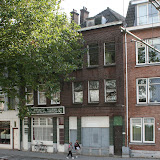For several decades, squatting has been legal in The Netherlands. A building or flat can be squatted which has been vacant for more than one year and if there is no building or renovation permit signed.
However, legalized squatting is probably in its twilight, as the Christian-conservative party (VVD) hopes to pass an anti-squatting bill this year. Before the bill passes, two foreigners partook in this Dutch social experiment, and this is how they did it.
The first step was education about squatting laws and searching for a vacant building. Education about squatting was taught by practicing squatters and the man behind Squatnet Rotterdam and the Autonomous Library, which yielded the best and most reliable information. After spending many weekends scouting vacant buildings by bicycle, two or three buildings were recommended to us by Rotterdam natives. The difficulty in finding a suitable building is not finding just an empty place, but having proof that it has been empty for at least one year.
The building we finally decided upon was very low-risk; it had already been squatted once before (though when abandoned it was reclosed), the owner was known for being respectful of squatters, and there were no redevelopment plans (in fact the final destination is demolition). Additionally, a friend provided documents proving that it had been empty for more than one year. For other buildings we looked at, we used the free resource at the City Information Point wherein the owner of any building can be ascertained.
When it comes to squatting, the only illegal activity is breaking and entering. Dutch law states that once inside the building, if no damage from breaking and entering can be seen, and there is a bed, table and chair present and the door can be locked from inside and out, the occupants of the building have what is called House Peace. Once House Peace has been established, the occupants become tenants of the building and assume the appropriate rights.
In our case, an open window provided the opportunity to enter without breaking. Once inside the building, we removed the metal security door and built a new front door lock and installed our appropriate furniture. After this, it is advisable to inform the police so that they can document the House Peace, after which anyone else coming into the house is trespassing, including the owner. The police took about five days before they finally visited our squat, before which at least one person was always inside the building, should any mischief arise. When the police finally arrived, they checked to make sure that the house was livable and that we seemed like decent people. On their way out, one officer said, “Welcome to the neighborhood.”
We were lucky with the house we chose because it still had running water, electricity and gas. The power company was happy to transfer the bills to our names, without asking anything about the legal status of the building (money talks).
The final step towards total legitimacy was registering to live in the squat with the municipality. At some point this was frowned upon by the bureaucrats, but hard work by one particular lawyer gave squatters their full legal rights. But it still took over two hours in city hall to work through the system, much like a typical DMV in America. We were able to register after the municipality sent a control team to make sure we actually inhabited the building.
In the meantime, we have been cleaning up after the previous squatter’s mess, improving the infrastructure, such as electrical wiring and plumbing, and applying a fresh coat of paint to the 75+ year old house.
What benefits does The Netherlands have from legalized squatting?
- Reduced speculation on property
- Inexpensive housing
- High space-use efficiency
- Thriving anti-squat* industry
*Anti-squatters are people who live in vacant buildings under a contract with the owner. The anti-squatting tenants have the benefit of large spaces for cheap rent while the owner keeps the buildings occupied to resist squatters and can evict the anti-squatters with two weeks notice.
It has been rewarding to participate in this Dutch social experiment while the doors are still open, so to say. Our rent has been reduced to only the utility bills. We have learned about the Dutch legal system. And, it has been great fun to put our hands to work on building a new creative home, free of rental contracts and landlords.
More information about squatting in The Netherlands.
Photos from our house:
 |